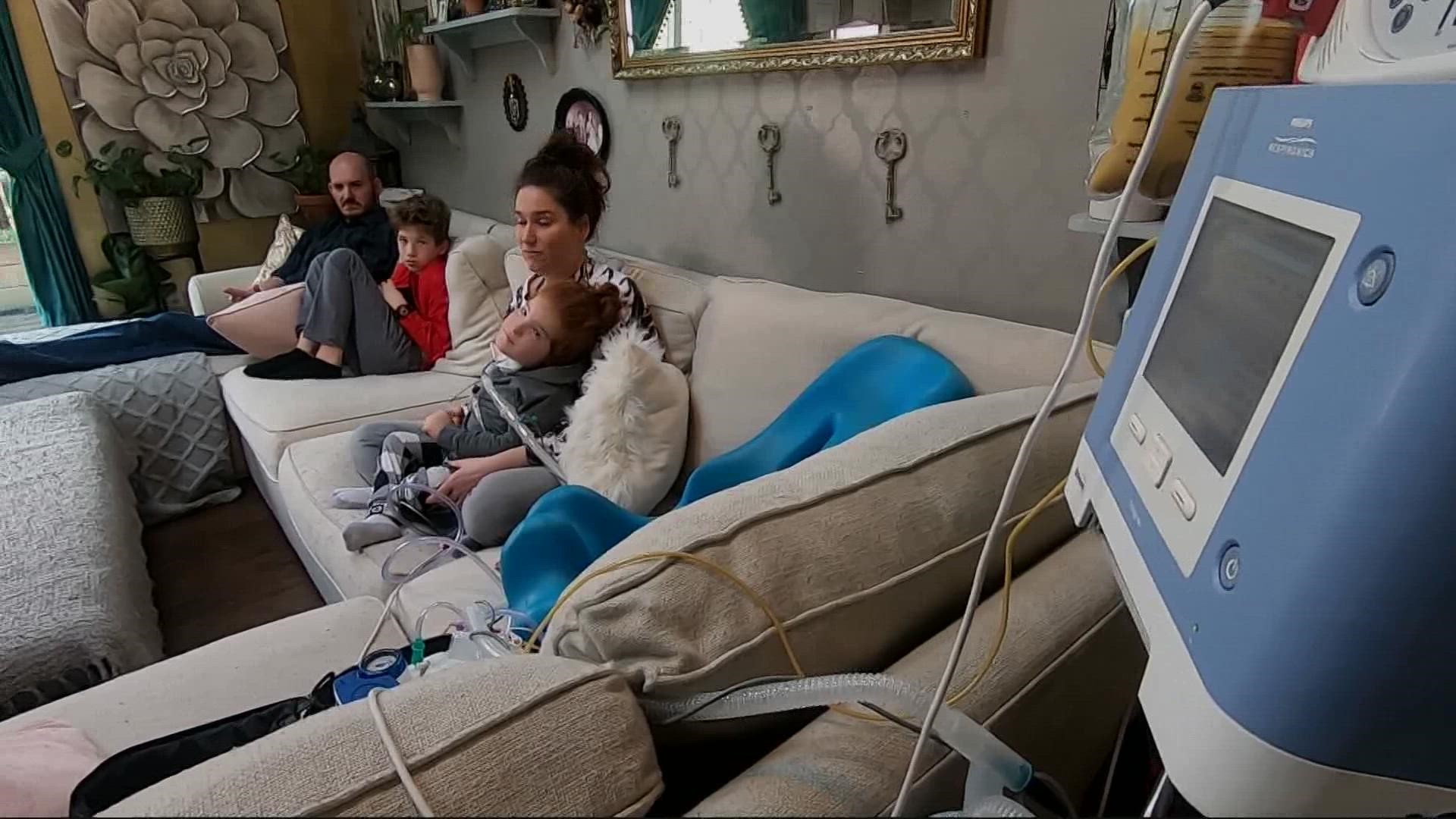OREGON, USA — Before the pandemic hit Oregon, state law did not allow the parents of minors with disabilities to be paid as their child's caregiver, but during COVID-19, the Office of Disabilities Services applied for and received a federal waiver allowing it during the public health emergency.
With that public health emergency set to end on July 15, the exception will end as well, unless the state takes action to make the temporary policy permanent.
Families of children with serious, round-the-clock needs are calling for this change, with a dwindling number of qualified caregivers and nurse available outside of the home.
Calli Ross and her family have been advocating for policy change even before the pandemic.
"It is ridiculous that this program should be discontinued and parents should be left hanging once again," she said.
Her son, Tens, is seven years old. He was born with 1p36 deletion syndrome, in which a small segment of DNA is missing, and a form of primordial dwarfism. On top of that, he's had several health complications that have led to his total reliance on a ventilator to breathe.
"He's vent dependent. He is oxygen dependent. He requires a specific feeding schedule. He has moments of crisis where he stops breathing. He has seizures," said Ross.
Due to his disability, he qualifies for more than 500 hours a month of in-home intensive services through Medicaid. A pandemic rule-change allowed his parents and others like them to be paid to provide those services to their children. The Office of Developmental Disability Services (ODDS) told KGW the temporary waiver was put in place to reduce exposure to COVID-19.
"It's life-changing money, but not large. It’s not large, but it’s enough to help families," said Ross.
With the money, Ross said she doesn't have to choose between medications and food. Her family can afford to pay for things not covered by insurance, like a potty training chair or a wheelchair-accessible van. She's set aside some money for tools and intensive therapies for Tens.
If the temporary program ends, the hours Tens qualifies for might not be staffed, due to a shortage of caregivers that was made worse during the pandemic.
"What we are currently facing right now is a caregiver crisis where there are just not nurses or caregivers available," Ross said. "We have 540 hours that we qualify for the month through the state, and of those, we only have 180 staffed. The rest of the time, my son requires 24/7 care. My husband or myself are by his side, awake, ready to go ahead and rescue him should we need to do that."
Because of the lack of available, qualified caregivers and support staff, ending the program puts hundreds of other families in a tough spot.
"Nursing and outside help's not always the answer and I am the best most qualified caregiver," said parent Tina Stracener. "We do want the nursing support we need to keep [my daughter] at home, but I want to be the person who takes care of her primarily, and I really need to be compensated for that so I can continue to do it."
"Paid parent caregivers keep families stable. They keep children healthy and out of institutions," said parent Gabriel Triplett. "If the state of Oregon…does not act, we are going to see hundreds, if not more, disability families thrown into crisis."
One of the biggest fears families have is that without enough caregivers, they will have to make an impossible choice for their children: to consider having them institutionalized.
"I don’t know what is going to happen in July when this money is cut off," said parent Katherine Ball. "I think that we are going to be in a horrible mess. People will have to give up their children, go back to work... I mean, I don’t know what’s going to happen, but this has to be made a permanent decision. We’ve seen how much this has helped our families."
These families are now fighting to at least allow the option of a paid parent caregivers permanently. They appealed to the state's Medicaid Advisory Committee and that group is now recommending a permanent policy to ODDS.
"Our goal is to meet in front of the emergency board of legislators and get a six- month reprieve from July until they can make new legislation in February 2023," explained Ross.
A spokesperson for ODDS said, in a statement, that "The question of whether this temporary allowance should be made permanent is a complex policy issue with strong advocacy of differing opinions from many involved in the intellectual and developmental disabilities system and would require changes to state regulations and additional approval by Centers for Medicare and Medicaid Services."
The state confirms a meeting is set up with parent-advocates, and that ODDS is coordinating with legislative partners on a process for resolving this issue.

